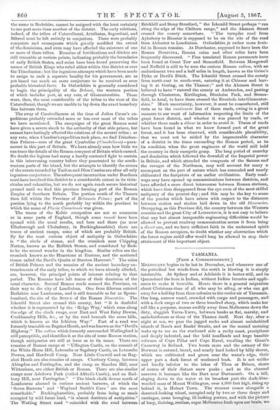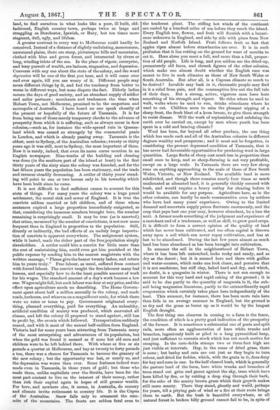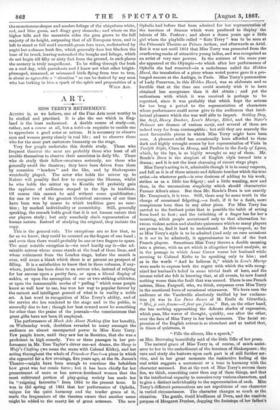TASMANIA.
[FROM A CORRESPONDENT.] MELBOURNE begins to be hot in December, and whenever one or the periodical hot winds from the north is blowing it is simply intolerable. At Sydney and at Adelaide it is hotter still, and in Queensland the heat is Indian, without Indian luxuries and appli- ances to make it bearable. Hence there is a general migration. about Christmas-time of all who may be ailing, or who can get. away for a holiday from these colonies to the cooler air of Tasmania.. Our long, narrow vessel, crowded with cargo and passengers, and with a deck cargo of two or three hundred sheep, which make her- roll like a porpoise, steams swiftly away from Melbourne down the dirty, sluggish Yarra-Yarrs., between banks as fiat, marshy, an malodoriferous as those of the Thames itself. Next day, after a- night at sea, we pass the jagged rocks and almost uninhabited islands of Bass's and Banks' Straits, and on the second morning- wake up to see on the starboard side a rocky coast, precipitous. and deeply indented, and the bold headlands and huge basaltie columns of Cape Pillar and Cape Raoul, recalling the Giant's- Causeway in Ireland. Two hours more and the estuary of the- Derwent is entered, broad, and nearly land locked by hilly shores, which are cultivated and green near the water's edge, their. upper part a dark forest of uncleared bush. It is not unlike and hardly inferior to the lakes of Thun or Brieuz, shorn of course of their distant snow peaks ; and as the channel narrows it becomes like the Dart near Dartmouth. On a hill, sloping down to the water at its broadest part the dark-blue- wooded mass of Mount Wellington, over 4,000 feet high, rising up behind it, is Hobart Town. The steamer comes alongside a deserted-looking wharf, occupied only by two or three drays and carriages, some lounging, ill-looking porters, and with the picture. of busy, thriving, restless, eager Melbourne fresh upon our brain, we-
land, to find ourselves in what looks like a poor, ill built, old- fashioned, English country town, perhaps twice as large and straggling as Dorchester, Ipswich, or Bury, but ten times more stagnant, dull, ugly, and lifeless.
A greater contrast in every way to Melbourne could hardly be conceived. Instead of a distance of slightly undulating, monotonous, unwatered plains, there are steep, picturesque hills and mountains, clothed with blue and green forest, and intersected by rivers or long, winding inlets of the sea. In the place of vigour, enterprise, and busy pursuit of wealth, are laziness, stagnation, and depression. Converse with any one about the state of the colony, and the word depression will be one of the first you hear, and it will come over and over again, till you are weary of it. Different people may mean different things by it, and feel the tendency from better to worse in different ways, but none dispute the fact. Elderly ladies mourn the days of good society, and an abundant supply of soldier and sailor partners ; merchants and tradesmen the time when Hobart Town, not Melbourne, promised to be the emporium and metropolis of Australia. I have heard no one speak cheerily of the present or hopefully of the future of Tasmania. It is far from being one of those merely temporary checks to the advance of prosperity from which it is suffering, such as always occur in new colonies,—such as, for instance the wide-spread ruin in Queens- land which was caused so strangely by the commercial panic in London, and which is already passing away. Tasmania is the oldest, next to Sydney, of the Australian colonies ; twenty or thirty years ago it was still, next to Sydney, the most important of them. Now it is rarely, indeed, that even its name earns mention in an English newspaper. Nine-tenths of the building and clearing was done (in the southern part of the island at least) in the first thirty years of the sixty since the colony was founded, and for the last fifteen years the population has been stationary, and the trade and revenue steadily decreasing. A settler of thirty years' stand- ing will point to one or two houses only in his township which have been 'built since he came.
It is not difficult to find sufficient causes to account for this state of things. For many years the colony was a huge penal settlement, the moral sink and sewer of England. It is true the convicts seldom married or left children, and of those whose sentences expired a large proportion immediately emigrated, so that, considering the immense numbers brought here, the number remaining is surprisingly small. It may be true (as is asserted) that crime, measured by the number of convictions, is not now more frequent than in England in proportion to the population. Still, directly or indirectly, the bad effects of an unduly large importa- tion of convicts is apparent everywhere. The assignment system, while it lasted, made the richer part of the free;population simply slaveholders. A settler could hire a convict for little more than the cost of maintaining him, could even get him punished at the public expense by sending him to the nearest magistrate with the written message, "Please give the bearer twenty lashes, and return him to yours truly." Free labour, as usual, suffered from contact with forced labour. The convict taught the free labourer many bad lessons, and especially how to do the least possible amount of work for his wages. The standard amount of a day's work became a low one. Wages might fall, but such labour was dear at any price, and the effect upon agriculture needs no describing. The Home Govern- ment spent about half a million annually in the colony, and made roads, harbours, and wharves on a magnificent scale, for which there were no rates or taxes to pay. Government originated every- thing, planned everything, paid for everything. An unhealthy, artificial condition of society was produced, which enervated all claasag, and left the colony ill prepared to stand against, still less to profit by, the events which followed. Transportation suddenly ceased, and with it most of the annual half-million from England. Victoria had for some years been attracting from Tasmania many of the most enterprising and adventurous of its population, but when the gold was found it seemed as if none but old men and children were to be left behind there. With wheat at five or six pounds a quarter at Melbourne, and hay at twenty to forty pounds a ton, there was a chance for Tasmania to become the granary of the new colony ; but the opportunity was lost, or nearly so, and the depression was worse than ever. Some fortunes indeed were made even in Tasmania, in those years of gold ; but those who made them, unlike capitalists over the Straits, have been for the most part content to live on the interest of their money, rather than risk their capital again in -hopes of still greater wealth. For here, and nowhere else, it seems, in Australia, do scenery and climate invite retirement to country life. It is the Capna of the Australias. Snow falls only to ornament the sum- mits of the mountains. The frosts are seldom fatal even to
the tenderest plant. The stifling hot winds of the continent are cooled by a hundred miles of sea before they reach the island. Every English tree, flower, and fruit will flourish with a luxuri- ance unknown in England, and side by side with pines from New Zealand and Norfolk Island. Fruit follows fruit so fast that apples ripen almost before strawberries are over. It is in such profusion that it lies rotting on the ground for want of mouths to eat it. Here alone you meet a full, and more than a full, propor- tion of old people. Life is long, and you seldom see the dried-up, prematurely old faces, and shrunk figures of the other colonies, which make one almost doubt whether the English race was meant to live in such climates as those of New South Wales or South Australia. But after all, is a Capuan climate so much to be desired? Invalids may bask in it, rheumatic people may find in it a relief from pain, and the consumptive live out the full tale of their days. . But a strong, active, vigorous man loses here something of his strength and vigour. He rides where he used to walk, walks where he used to run, drinks stimulants where he used to eat. Children seem to miss the pleasant nipping of a sharp frost, the fresh blast of a keen breeze, to give them strength to resist disease. Will the work of replenishing and subduing the earth ever be carried on, except by men whose youth has been spent in a cold and bracing climate?
Wool has been, far beyond all other produce, the one thing which has made each and all of the Australian colonies in different degrees wealthy and prosperous ; and it must not be forgotten, in considering the present depressed condition of Tasmania, that it has never had favourable opportunities for producing wool in large quantities. Large flocks of sheep cost much less in proportion than small ones to keep, and so sheep-farming is not very profitable, except on a large scale. In Tasmania there are very few sheep rune on anything approaching to the scale of those of New South Wales, Victoria, or New Zealand. The available land is more subdivided, and though there remains nearly four times as much unalienated as alienated land, it is generally thickly covered with bush, and would require. a heavy outlay for clearing before it would be available for any purpose. Agriculture here, as in the other colonies, can hardly be made remunerative even by settlers who have had many years' experience. Owing to the limited demand and uncertain supply prices fluctuate enormously, and the crop that pays best one year may, however abundant, be a loss the next. A farmer needs something of the judgment and experience of a merchant and of a tradesman, as well as skill, to grow good crops. It is difficult to form a correct opinion of the quality of land which has never been cultivated, and too often capital is thrown away upon a soil which can never repay cultivation, and has at last to be abandoned. During the last few years almost as much land has been abandoned as has been brought into cultivation.
In summer the soil in the neighbourhood of Hobart Town, where it has been left untouched, looks rocky and sandy, and as dry as the desert ; but it is seamed here and there with gullies and water-courses, which make one look closer, and perceive that it is not sandstone, but stiff clay, baked hard and dry, and which, no doubt, is a quagmire in winter. There is not sun enough to account for this very hard and rapid caking of the ground ; it is said to be due partly to the quantity of magnesia in it, the sub- soil being magnesian limestone, partly to the extraordinarily rapid evaporation which certainly takes place here independently of the heat. This summer, for instance, there has been more rain here than falls in an average summer in England, but the ground is as dry and the grass as burnt up as it would be by the longest English drought.
The first thing one observes in coming to a farm is the fence, the condition of which is a pretty good indication of the prosperity of the farmer. It is sometimes a substantial one of posts and split rails, more often an agglomeration of bare white trunks and branches, ingeniously built or piled in a long pyramidical heap, and just sufficient to restrain stock which has not much motive for escaping. In the corn-fields stumps two or three feet high are just visible at intervals. Hay, in the sense of dried grass, there is none ; but barley and oats are out just as they begin to turn colour, and dried for fodder, which, with the grain in it, does duty for hay and corn in one. In the half cleared bush, which is generally the pasture land of the farm, bare white trunks and branches of trees stand out grim and gaunt against the sky, trees which have been killed by fire, or by cutting a deep ring through their bark, for the sake of the scanty brown grass which their growth makes still more scanty. There they stand, ghostly and weird, perhaps for years, till a pitying gale of wind or a fire at their roots brings them to earth. But the bush is beautiful everywhere, as all natural forest in broken hilly ground cannot fail to be, in spite of the monotonous shapes and sombre foliage of the ubiquitous white, red, and blue gums, and dingy grey sheaocks ; and where on the higher hills and the mountain sides the gum grows to the full majesty of its height, surpassing that of all European trees, and is left to stand or fall amid emerald-green fern trees, undisturbed by aught but a chance bush fire, which generally does but blacken the base of its trunk, leaving untouched the boughs and foliage, which do not begin till fifty or sixty feet from the ground, in such places the scenery is truly magnificent. To be riding through the bush on a cool day, with parrakeets and I know not what other bright- plumaged, unnamed, or misnamed birds flying from tree to tree, is about as agreeable a " situation " as can be desired by any man who has lurking in him a spark of the spirit and propensities of a
WLLD Ass.
































 Previous page
Previous page